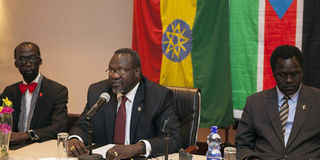US warns of new sanctions against S.Sudan leaders as talks snubbed

Riek Machar (center), South Sudanese Rebel Opposition leader, speaks during a press conference at the Radisson Hotel in Addis Ababa, Ethiopia, on July 9, 2014. The United States warned on Thursday of possible new sanctions on South Sudanese leaders as President Salva Kiir snubbed talks in New York on the nine-month conflict wracking his country. PHOTO| AFP
What you need to know:
- The official stressed that the east Africa regional bloc, known as IGAD, which has been mediating sputtering peace talks, shared the view that more sanctions may be necessary
- In August, Kiir and rebel leader Riek Machar signed a new ceasefire deal — the fourth since fighting began nine months ago — aiming to forge a unity government by October 9
- The UN has estimated that 3.9 million people in the country are failing to get regular food
NEW YORK
The United States warned on Thursday of possible new sanctions on South Sudanese leaders as President Salva Kiir snubbed talks in New York on the nine-month conflict wracking his country.
Instead, Kiir sent his foreign minister to join the discussion on the sidelines of the UN General Assembly.
“There was a lot of disappointment expressed in the meeting that Salva Kiir, who is in New York, did not attend the meeting,” a senior State Department official told reporters.
“Several of the attendees... made a point of noting that Salva Kiir was not there,” the official added, asking not to be named.
Washington has already imposed sanctions on several South Sudanese from both the government and the rebels, and more could be on the way.
“All of the parties who are involved in the negotiations have come to the conclusion that if the warring parties do not take this seriously, then we have to levy more sanctions on them,” the official said.
SANCTIONS NECESSARY
The official stressed that the east Africa regional bloc, known as IGAD, which has been mediating sputtering peace talks, shared the view that more sanctions may be necessary.
In August, Kiir and rebel leader Riek Machar signed a new ceasefire deal — the fourth since fighting began nine months ago — aiming to forge a unity government by October 9.
“The important point here is that the neighbours and the IGAD negotiators also have to be an active participant in the sanctions regime,” the State Department official said.
“They have indicated that they actually are at a place where if these negotiations do not move forward that they’re willing also to impose sanctions on both sides.”
The peace talks resumed in Ethiopia on Monday, mediators said, as sporadic fighting continued to rage between rebel and government fighters in the oil-rich country.
FOOD CRISIS
Meanwhile, the scale of South Sudan’s food crisis remains a massive unknown, with aid workers fearing the worst in isolated parts of the conflict-ravaged country, the international Red Cross said on Thursday.
“The situation is critical,” said Dominik Stillhart, director of operations at the International Committee of the Red Cross.
“What remains to be seen now is are there populations out there that are completely under the radar today?” he told reporters.
The UN has estimated that 3.9 million people in the country are failing to get regular food.
“We will see probably at the end of the rainy season, probably when access will be improving, whether we can speak about famine,” said Stillhart.





